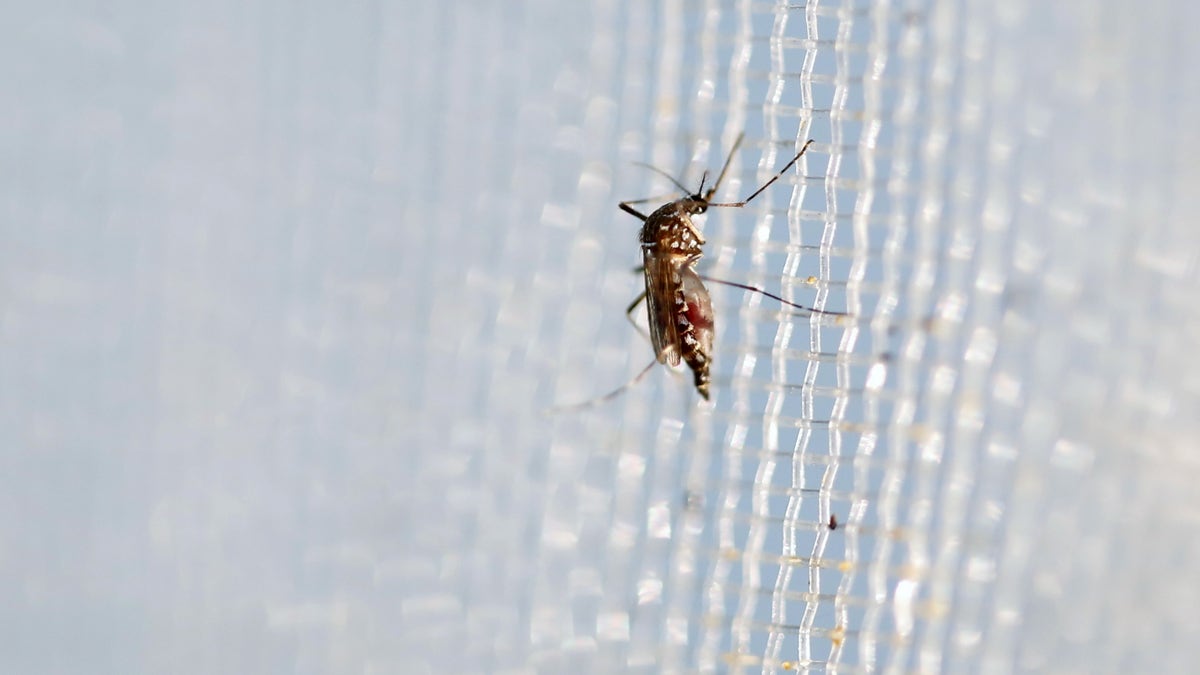
An aedes aegypti mosquitoes is seen in The Gorgas Memorial institute for Health Studies laboratory as they conduct a research on preventing the spread of the Zika virus and other mosquito-borne diseases in Panama City February 4, 2016. REUTERS/Carlos Jasso - RTX25IDW
TRENTON, N.J. (AP) -- Worried you might catch the Zika virus? Scammers and bug spray companies are counting on it.
Marketers know this is the time to pounce: The summer Olympics are about to start in Brazil, where the recent Zika epidemic started, and 14 mosquito-borne cases of Zika were identified recently in the Miami area, the first in the U.S. So companies and entrepreneurs are capitalizing on Zika fears wherever mosquitoes buzz, hawking questionable products like anti-Zika wristbands and promoting all manner of mosquito repellents for people and pets.
"From a marketing point of view, it's a golden opportunity," said Jonathan Day, a University of Florida mosquito expert and researcher.
In a first for a bugspray, Off! became the official insect repellent supplier for an Olympic Games, and agreed to send 115,000 sprays, spritzers and towelettes to the Rio Olympics. Rival Cutter in June signed on to sponsor the U.S. men's and women's national soccer teams.
Both companies are likely to benefit from Zika fears far beyond supplying athletes and fans in Brazil. Pharmacies in New York City, for example, have Off! displays warning consumers to "Repel the mosquitoes that may carry the Zika virus." The tropical mosquito responsible for the Zika epidemic, called Aedes aegypti, is not found in New York, though state health officials still recommend that people use bug spray.
Zika is usually spread when the mosquito picks it up by biting an infected person and bites someone else. It is worrying disease, of course, especially for pregnant women. Its symptoms are often so mild that most people don't know they have it, but it has been found to cause severe birth defects if women are infected while pregnant.
Health officials say people in Zika-affected areas should take steps to avoid getting or spreading the disease by wearing long pants and long-sleeved shirts and using insect repellent. The Centers for Disease Control and Prevention specifically mentions brands like Off! and Cutter in its recommendations .
Zika can also be transmitted by sex, so the CDC recommends using condoms to prevent spreading the virus if one partner is infected, or might be.
In a marketer's hand, that kind of recommendation turns a condom into a Zika-fighting device. Australia's Ansell Ltd. is supplying that country's Olympic team with "anti-Zika condoms" lubricated with an antiviral gel. But that gel has never been tested outside a laboratory, and experts say any condom will do the job.
Some enterprising marketers are trying to make a few dollars by rebranding products as Zika fighters.
Among them is a Louisiana exterminator who is hawking a $1,678 outdoor mosquito misting system as the "Zika Cube." Its maker, Katy, Texas-based Pynamite Mosquito Misting Systems, said it didn't authorize sales of its product under that name and will order the man to stop, though Pynamite's website does say "effective mosquito control in your yard is the best way to prevent Zika and other mosquito-related diseases."
A website called "anti-zika.com" offers $6 "anti-zika" repellent with a "formula specifically designed to combat the Zika virus." Its website says the stuff has similar ingredients to mainstream brands, but offers no details about its "specifically designed" formula. The company hasn't responded to a request for comment.
New York Attorney General Eric Schneiderman says his office has sent letters to seven companies, telling them to stop marketing products as "Zika-preventive" or "Zika-protective."
While some companies are using Zika worries to goose sales of products that could prevent mosquito bites, others are claiming benefits far beyond what regulators have verified.
Officials are warning consumers away from ultrasound bug zappers, $20 insecticide-containing wrist and ankle bands such as "Mosquitno," and "Spotz," Citronella-infused stickers that adhere to clothing and supposedly repel mosquitoes for three days. The Federal Trade Commission this spring fined one wristband maker $300,000 for falsely claiming its bands create a five-foot mosquito barrier protecting wearers for days.
Experts say to stick with what works, like products with DEET. Research by Day, the University of Florida entomologist, found that while repellents approved by federal agencies that contain citronella, lemon eucalyptus oil and other herbal extracts provide some protection, it can last from just a few minutes to an hour or so. In contrast, he found products containing 23.8 percent DEET, such as Off! Deep Woods, can protect against mosquito bites for 3 to 6 hours.
And that's what most people are buying, whether they are near Zika-carrying mosquitoes or not: Off! maker SC Johnson in February ramped up to 24-hour, 7-day a week production, the family-owned company says.
Spectrum Brands Inc. said retailers have seen sales double over last year's for its repellent brands, Cutter and Repel. It's also boosted production, and started mentioning Zika on its repellent cans.
"We don't want to scare consumers," brand manager Ashley Henderson says. "We want to empower them."
The maker of Mosquito Bits and Mosquito Dunks, tablets containing bacteria that the company says kill mosquito larvae in water, said it's having one of its best sales years ever. Demand has spiked in Texas and across the Southwest - and in less-than-tropical locations, too.
"We're getting calls from as far north as Canada," said company vice president Zach Cohen.








































